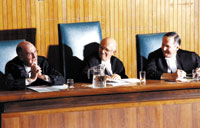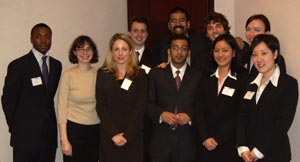The Moot Court Committee is a student-run organization responsible for the law school’s extensive mooting program. The program offers students opportunities to practice and improve their oral advocacy skills.
Grand Moot
 The most popular event in the moot court calendar is the annual Grand Moot, in which students can watch four of the law school's top mooters in action. Held in late September, the Grand Moot is a demonstration event where mooters appear before a distinguished bench that typically includes justices of the Ontario Court (General and Appellate Divisions) and the Supreme Court of Canada.
The most popular event in the moot court calendar is the annual Grand Moot, in which students can watch four of the law school's top mooters in action. Held in late September, the Grand Moot is a demonstration event where mooters appear before a distinguished bench that typically includes justices of the Ontario Court (General and Appellate Divisions) and the Supreme Court of Canada.
Beginning in 2006, the Grand Moot has been recorded on video and available for viewing over the web. To watch a Grand Moot from a specific year, go to the relevant page above.
Back to Top
Mooting in First Year
 During the second term of first year, students can try out for the first-year competitive moot.
During the second term of first year, students can try out for the first-year competitive moot.
Arguing from facta prepared by upper-year students, the voluntary moot is a good opportunity for students to practise oral advocacy skills before fulfilling their moot requirement in second year. The Moot Court Committee supplies the cases and coaching, and students supply the performances.
A limited number of students participate in the annual competitive moot available in first year against Osgoode Hall Law School, in a moot modeled on the Gale Cup and sponsored by the law firm of Cassels Brock
Back to Top
Competitive Mooting
Upper-year students with a particular interest in mooting are eligible for selection to competitive moot teams that represent the law school on both a national and an international level. These competitive moot teams are consistently among the best in the country, bringing home both national and international honours.
In order to allow as many students as possible to participate in competitive mooting, students are limited to participating in one competitive moot during their tenure at the Faculty. Some anomalous mooting experiences are excluded from this limit. The in-house show case Grand Moot, the Kawaskimhon consensus moot, the Arnup Cup trial level advocacy competition, the Walsh Family Law Negotiation competition, and any progressive moots that flow from a student’s first appellate moot, such as the championship round of the Jessup are all excepted from this cap.
The law school currently sends teams to the following competitions:
- Arnup Cup Trial Advocacy Competition
- Bowman Tax Moot
- Callaghan Memorial Moot
- a competition pitting mooters from the Faculty of Law against one another. This moot provides 16 students an opportunity to moot on a topic in the area of criminal or constitutional law.
- Canadian Corporate/Securities Moot
- sponsored and hosted by Davies, Ward, Phillips & Vineberg LLP, students participating in this competition debate issues of corporate and securities law.
- Canadian Labour Arbitration Competition
- held by Mathews, Dinsdale & Clarke LLP, students prepare both management and union-side argument on a labour law issue.
- Competition Law Moot
- hosted by the Competition Bureau, the CBA, and the Competition Tribunal, students delve into regulatory/commercial litigation to balance private economic incentives with the public interest.
- Fox Moot (Intellectual Property)
- Gale Cup Moot
- focusing on a constitutional-criminal law issue, this moot competition for Canadian law schools is held in Toronto each year at the Osgoode Hall Law Courts.
- Julius Alexander Isaac Moot
- Jessup International Moot
- an international law moot, the winner from among the Canadian schools goes to Washington for a final round involving schoolsteams from around the world.
- Kawaskimhon National Aboriginal Law Moot
- Laskin Moot
- covering administrative and constitutional law issues, this is a bilingual competition among Canadian law schools.
- Walsh Family Law Moot
- Willms & Shier Environmental Law Moot Court Competition
- Wilson Moot
- named for Madam Justice Bertha Wilson, this national moot explores issues of equality and s.15 of the Canadian Charter of Rights and Freedom.
- Winkler Class Actions Moot.
Back to Top
Competitive Moot Results
Back to Top
Mooting Resources and Funding
The Law Faculty reimburses students for expenses related to attending oral advocacy competitions that require travel. The Faculty will pay for mooters' economy travel expenses and hotel accommodations, assuming double occupancy.
The Bora Laskin Law Library has prepared a mooting module as part of its online legal research and writing tutorial.
Reverse Moot
To celebrate the 50th anniversary of the Faculty of Law in 2002, the law school organized a reverse moot, in which Justices Rosalie Abella and Stephen Goudge of the Court of Appeal of Ontario, and Justices Ian Binnie and Frank Iacobucci of the Supreme Court of Canada, argued a case in front of a panel of judges made up of students and recent graduates of the law school who were involved in the mooting program, chaired by Justice Robert J. Sharpe of the Court of Appeal of Ontario.
Back to Top

 The most popular event in the moot court calendar is the annual Grand Moot, in which students can watch four of the law school's top mooters in action. Held in late September, the Grand Moot is a demonstration event where mooters appear before a distinguished bench that typically includes justices of the Ontario Court (General and Appellate Divisions) and the Supreme Court of Canada.
The most popular event in the moot court calendar is the annual Grand Moot, in which students can watch four of the law school's top mooters in action. Held in late September, the Grand Moot is a demonstration event where mooters appear before a distinguished bench that typically includes justices of the Ontario Court (General and Appellate Divisions) and the Supreme Court of Canada. During the second term of first year, students can try out for the first-year competitive moot.
During the second term of first year, students can try out for the first-year competitive moot.